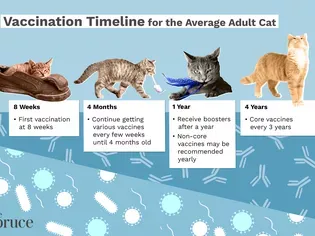The Average Adult Cat Vaccination Schedule
Updated on 04/26/24

Protect Your Feline Companion: A Comprehensive Guide to the Average Adult Cat Vaccination Schedule
As responsible cat owners, we strive to ensure the health and well-being of our furry companions. Vaccination is an essential aspect of preventive care, providing vital protection against infectious diseases that can threaten their lives. This guide will provide a comprehensive overview of the average adult cat vaccination schedule, empowering you to make informed decisions about your cat's health.
Why Vaccinations Are Important
Vaccinations stimulate the immune system, priming it to recognize and fight off specific pathogens. By introducing a weakened or inactivated form of the virus or bacteria, the vaccine triggers the production of antibodies without causing disease. This means that if your cat is ever exposed to these diseases in the future, their immune system will be prepared to defend them.
Avoiding vaccinations can leave your cat susceptible to a range of serious and potentially fatal illnesses. These diseases can be highly contagious, spreading through contact with infected animals, contaminated objects, or the environment. By vaccinating your cat, you not only protect their health but also reduce the risk of infecting other cats and even humans.
Core and Non-Core Vaccines
Cat vaccines are divided into two categories: core and non-core. Core vaccines are considered essential for all cats, regardless of their lifestyle or risk factors. Non-core vaccines are recommended for cats based on their individual circumstances and potential exposure to specific diseases.
Core Vaccines
* Feline Panleukopenia Virus (FPV): Also known as feline distemper, FPV is a highly contagious and potentially fatal disease that affects the digestive system. Vaccination is crucial for all cats.
* Feline Herpesvirus-1 (FHV-1): This virus causes respiratory infections, including feline herpesvirus rhinotracheitis, which can lead to severe upper respiratory symptoms. Vaccination is highly recommended for all cats.
* Feline Calicivirus (FCV): FCV is another common cause of respiratory infections in cats. Vaccination can help prevent infection or reduce its severity.
Non-Core Vaccines
* Feline Leukemia Virus (FeLV): FeLV is a retrovirus that can cause a variety of health problems, including cancer and immunosuppression. Vaccination is recommended for cats at high risk of exposure, such as those living in multi-cat households or outdoor cats.
* Feline Immunodeficiency Virus (FIV): FIV is a retrovirus that suppresses the immune system, making cats more susceptible to other infections and diseases. Vaccination is recommended for cats at high risk of exposure, such as those that fight with other cats or live in areas with a high prevalence of FIV.
* Rabies: Rabies is a fatal neurological disease that is transmitted through the bite of an infected animal. Vaccination is required by law in most areas and is essential for cats that may come into contact with wildlife.
Frequency and Timing
The recommended frequency and timing of vaccinations vary depending on the specific vaccine and the individual cat's circumstances. Generally, core vaccines are administered as a series of two or three injections, with the first dose given around 8-10 weeks of age. Booster shots are typically given every one to three years to maintain immunity. Non-core vaccines are administered as a single dose or a series of injections, depending on the vaccine.
Discuss with Your Veterinarian
The best way to determine the most appropriate vaccination schedule for your cat is to consult with your veterinarian. They will consider your cat's lifestyle, risk factors, and any previous health conditions to make personalized recommendations.
Benefits of Vaccination
* Disease prevention: Vaccinations provide a proven method of preventing infectious diseases, protecting your cat from serious illness and death.
* Reduced veterinary costs: By preventing potentially costly diseases, vaccinations can save you money on veterinary expenses in the long run.
* Improved quality of life: A healthy cat has a longer and more enjoyable life. Vaccinations can help ensure that your cat remains active, playful, and free from debilitating diseases.
* Protection for other cats and animals: Vaccinating your cat not only protects them but also helps to create a "herd immunity" effect, reducing the risk of disease spread within the community.
Minor Side Effects
Most cats experience few or no side effects from vaccinations. However, mild reactions such as lethargy, decreased appetite, or a slight fever may occur. These side effects usually resolve within 24-48 hours. In rare cases, a cat may experience a more severe reaction, such as an allergic reaction. If you notice any unusual symptoms after your cat's vaccination, contact your veterinarian promptly.
Conclusion
Vaccination is a vital Bestandteil of responsible cat ownership. By understanding the average adult cat vaccination schedule and discussing it with your veterinarian, you can make informed decisions about your cat's health. Vaccinations provide proven protection against infectious diseases, safeguarding your feline companion's well-being and enhancing their quality of life. Remember, a healthy cat is a happy cat!
Explore More Pets

Cat Behavior Problems
How to Stop Aggression in Kittens

Long-Haired Cat Breeds
Siberian Cat: Breed Profile, Characteristics, & Care

Cat Behavior Problems
How to Stop Kittens From Scratching and Biting

Long-Haired Cat Breeds
Turkish Angora: Cat Breed Profile, Characteristics & Care

Basic Training
How to Socialize Your Kitten

Short-Haired Cat Breeds
Cute Pictures & Facts About Calico Cats & Kittens

Litter Box Training
Training Your Kitten to Use the Litter Box

Long-Haired Cat Breeds
10 Fun Facts About White Cats